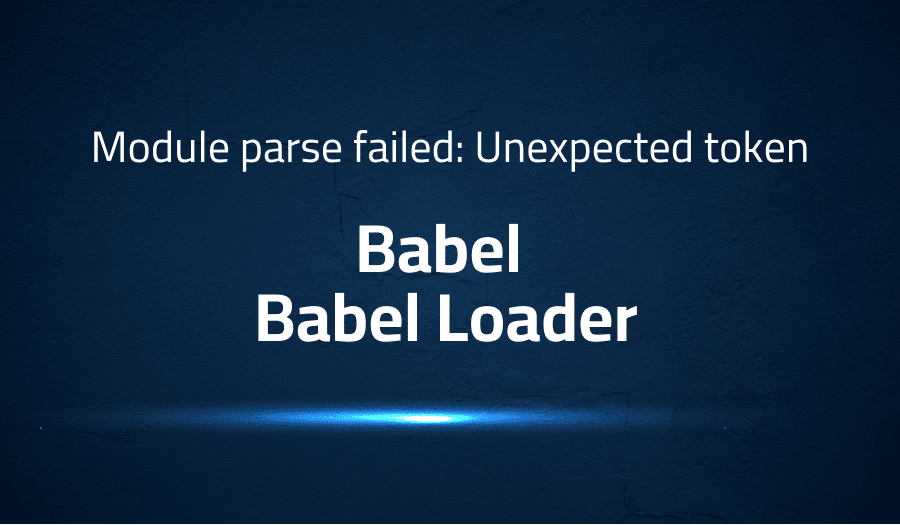

Module parse failed: Unexpected token in Babel Babel Loader
Explanation of the problem
The following error is encountered during the compilation of the application:
ERROR in ./App.js 188:13 Module parse failed: Unexpected token (188:13) You may need an appropriate loader to handle this file type. ERROR in ./Home.js 34:8 Module parse failed: Unexpected token (34:8) You may need an appropriate loader to handle this file type.
The entry point of the application is set to “./main.js” and the output is set to generate a file named “bundle.js” located in the root directory. The error is thrown while trying to parse the contents of the “App.js” and “Home.js” files.
Webpack Configuration:
The following code block represents the webpack configuration used in the application:
var path = require('path');
var webpack = require('webpack');
module.exports = {
entry: './main.js',
output: { path: __dirname, filename: 'bundle.js' },
module: {
rules: [
{
test: /.jsx?$/,
include: [
path.resolve(__dirname, 'path/to/imported/file/dir')
],
loader: 'babel-loader',
exclude: /node_modules/,
query: {
presets: ['es2015', 'react']
}
}
]
},
}
Dependency and Script Information:
The following code block lists the dependencies and scripts used in the application:
"dependencies": {
"missing": "0.0.1",
"react": "^0.14.7",
"react-dom": "^0.14.7",
"react-router-dom": "^4.3.1",
"webpack-dev-server": "^3.1.10"
},
"devDependencies": {
"babel-core": "^6.26.3",
"babel-loader": "^7.1.5",
"babel-preset-es2015": "^6.3.13",
"babel-preset-react": "^6.3.13",
"webpack": "^4.27.1",
"webpack-cli": "^3.1.2"
},
"scripts": {
"test": "echo \"Error: no test specified\" && exit 1",
"start": "webpack-dev-server"
},
"author": "",
"license": "ISC"
}
Troubleshooting with the Lightrun Developer Observability Platform
Getting a sense of what’s actually happening inside a live application is a frustrating experience, one that relies mostly on querying and observing whatever logs were written during development.
Lightrun is a Developer Observability Platform, allowing developers to add telemetry to live applications in real-time, on-demand, and right from the IDE.
- Instantly add logs to, set metrics in, and take snapshots of live applications
- Insights delivered straight to your IDE or CLI
- Works where you do: dev, QA, staging, CI/CD, and production
Start for free today
Problem solution for Module parse failed: Unexpected token in Babel Babel Loader
The error “Module parse failed: Unexpected token” can occur when using Babel Loader with Webpack. It is indicating that the loader is unable to parse the JavaScript file due to an unexpected token, which can refer to a syntax error or an unsupported syntax construct.
The solution to this error often involves making changes to the Babel Loader configuration or updating the dependencies and devDependencies in the project’s package.json file. One common fix is to ensure that the correct presets are included in the query for Babel Loader, as shown in the following code block:
rules: [
{
test: /.jsx?$/,
include: [
path.resolve(__dirname, 'path/to/imported/file/dir')
],
loader: 'babel-loader',
exclude: /node_modules/,
query: {
presets: ['es2015', 'react']
}
}
]
Another solution may involve updating the dependencies and devDependencies in the project’s package.json file to ensure that the correct versions of Babel and Webpack are being used. For example:
"dependencies": {
"react": "^0.14.7",
"react-dom": "^0.14.7",
"react-router-dom": "^4.3.1"
},
"devDependencies": {
"babel-core": "^6.26.3",
"babel-loader": "^7.1.5",
"babel-preset-es2015": "^6.3.13",
"babel-preset-react": "^6.3.13",
"webpack": "^4.27.1",
"webpack-cli": "^3.1.2"
},
Other popular problems with Babel Babel Loader
Problem: SyntaxError: Unexpected token
This issue occurs when Babel is unable to properly transpile the code due to a syntax error. For example, a user may have written a line of code in a new version of JavaScript, but their Babel setup may not support that version. In this case, the code will fail to compile and throw an “Unexpected token” error.
Solution:
The solution is to update the Babel configuration file, known as “.babelrc”, to include the correct presets that match the desired version of JavaScript. For example, if the user wants to use the latest version of JavaScript (ES6), they would need to include the “env” and “stage-0” presets. The updated “.babelrc” file would look like this:
{
"presets": ["env", "stage-0"]
}
Problem: babel-loader is not registered
This issue occurs when the babel-loader is not installed or registered in the Webpack configuration file. Babel-loader is used to transpile code written in JavaScript and convert it into code that is readable by the browser. Without the babel-loader, the code will not compile, and the Webpack will throw an error.
Solution:
To resolve this issue, the user needs to install the babel-loader npm package and add it to the Webpack configuration file. The first step is to run the following command in the terminal:
npm install babel-loader
Next, the user must add the following code to the Webpack configuration file to include the babel-loader:
module: {
rules: [
{
test: /\.js$/,
exclude: /node_modules/,
use: {
loader: "babel-loader"
}
}
]
}
Problem: ReferenceError: [BABEL] Unknown option
This error occurs when a user attempts to use an unsupported option in the Babel configuration file. For example, if a user tries to use an experimental feature that is not yet fully supported by Babel, they will receive a “ReferenceError: [BABEL] Unknown option” error.
Solution:
The solution is to check the Babel documentation to ensure that the desired option is supported and if not, to choose a different option or to wait until the desired option becomes supported. The user should also update their “.babelrc” file to remove the unsupported option.
A brief introduction to Babel Babel Loader
Babel is a popular JavaScript compiler which allows developers to write code using the latest version of the language, while still ensuring that the code runs in older browsers and environments. The Babel Loader is a Webpack plugin which allows you to use Babel with Webpack.
Babel Loader acts as a bridge between Webpack and Babel, transforming your JavaScript code from the latest version of the language into an older version that can be run in all environments. This is achieved through the use of plugins and presets. Babel has a large library of plugins that provide additional functionality, such as the ability to use JSX with React, and presets which are pre-configured collections of plugins for common use cases, such as the latest version of JavaScript or a specific framework.
Most popular use cases for Babel Babel Loader
- Transpiling: Babel Babel Loader can be used to transpile modern JavaScript code into a version that is supported by older browsers. This makes it possible to write modern JavaScript code and still support users on older browsers that do not support the latest JavaScript syntax.
module: {
rules: [
{
test: /\.js$/,
exclude: /node_modules/,
use: {
loader: 'babel-loader',
options: {
presets: ['@babel/preset-env']
}
}
}
]
}
- Polyfilling: Babel Babel Loader also provides the ability to polyfill modern JavaScript APIs to be used in older browsers. This is particularly useful when you are using modern JavaScript APIs that are not supported in older browsers.
options: {
presets: [
[
'@babel/preset-env',
{
useBuiltIns: 'entry',
corejs: 3
}
]
]
}
- Modules Bundling: Babel Babel Loader can be used to bundle multiple JavaScript files into a single file. This is particularly useful when you are working on a larger JavaScript project and want to avoid having to include multiple script tags in your HTML file. The bundled JavaScript file can be included in a single script tag, which can help improve the loading time of your website.
module.exports = {
entry: './src/index.js',
output: {
path: __dirname + '/dist',
filename: 'bundle.js'
},
module: {
rules: [
{
test: /\.js$/,
exclude: /node_modules/,
use: {
loader: 'babel-loader',
options: {
presets: ['@babel/preset-env']
}
}
}
]
}
};It’s Really not that Complicated.
You can actually understand what’s going on inside your live applications.




